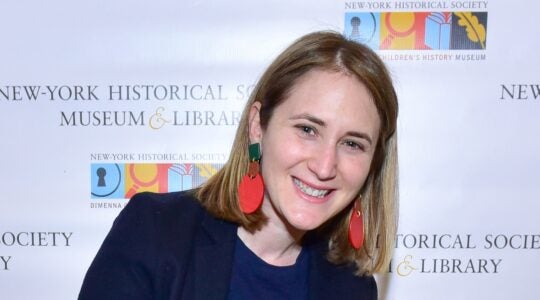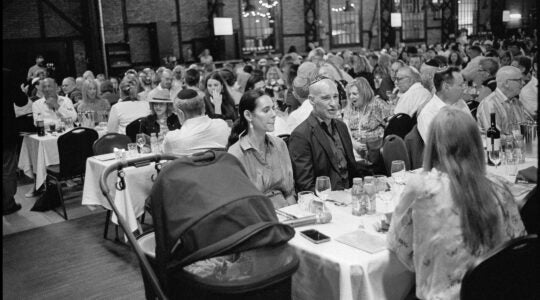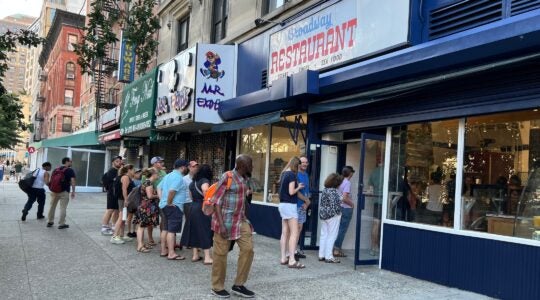Washington — They came from Memphis and they came from Midwood. They bused in from Bayside and they rode the rails from Richmond. There were Hoosiers and Bluegrass Staters and a soul or two from Alaska who took a long day’s journey into the Lower 48 wearing their love of the Jewish state — and their fears over its future — on their sleeves.
And they came — 200,000 strong, according to organizers — with a resoundingly clear message for the congressmen and women and senators standing on the steps of the Capitol, and for all of America, really: Israel’s fight against terrorism is the same as America’s.
And when it was all over, they had made history. On a sweltering April afternoon, Jews outraged by suicide bombings, and a number of them personally touched by the violence against Israelis, gathered peacefully in front of the Capitol Building to take part in the largest Washington rally in support of Israel in U.S. history.
Officially, Monday’s demonstration, hastily organized last week by the Conference of Presidents of Major American Jewish Organizations, was called to show solidarity with Israel and support President Bush’s global war on terrorism. But it took on a decidedly hawkish tone as most speakers and the grass roots expressed unofficial anger and angst over the seemingly unsolvable stalemate in Middle East, and while they were careful to praise the president, they called attention at times to Washington’s apparent inconsistent position on Israel’s current anti-terrorism military campaign in the West Bank.
“This is life and death; people sense it,” William J. Bennett, former drug czar under former President George Bush, told The Jewish Week before delivering a forceful speech of support for Israel.
“I am here as one of tens of millions of Americans who have seen in the founding and flourishing of the Jewish state the hand of the same beneficent God who attended our own founding,” Bennett proclaimed before the masses, who took off from work and school to show their support.
Many schools were closed, including Yeshiva University, the Jewish Theological Seminary, and numerous day schools and yeshivas. Officials arranged for hundreds of buses at the last minute.
A Christian Evangelist radio talk show host and a nun were among the non-Jewish speakers who defended Israel. But there were no prominent mainstream Christian or Catholic leaders heard from, as they were in June 1967 during the Six-Day War and the last major rally for Israel here.
“We stand together with our Jewish brothers and sisters,” said Janet Parshall, spokesperson for the Christian Conservative Family Research Council. “We will never give up the Golan! We will never divide Jerusalem!” she declared.
The mostly Jewish crowd — some in shorts and T-shirts and others in the white shirts and black hats seen in the haredi community — filled the expanse of the west lawn of the Capitol to the reflecting pool.
Under a clear blue sky and blazing sun that caused some to faint and others to seek shade under colorful blooming trees, demonstrators heard a series of tough, uncompromising speeches from leading Israeli and American politicians. The speakers branded Palestinian Authority President Yasir Arafat a terrorist and denounced Palestinian “homicide bombings” and the rising tide of world anti-Semitism.
“We are here to express our sense of community with Israel, which feels alone and abandoned,” declared Presidents Conference chairman Mortimer Zuckerman. “Israel has joined the mountains of Afghanistan as the front line in the war against terrorism, and we are here, figuratively, to be with them in the foxhole that they are in.”
Organizers tried to walk a fine line between expressing praise for President Bush’s support of Israel and his global war on terrorism, with criticizing Bush over his recent flip-flopping on support for Israel Prime Minister Ariel Sharon’s weeks-old anti-terrorism campaign, and Secretary of State Colin Powell’s meetings this week with Arafat.
Wolfowitz Booed
The rally’s hard line mood was perhaps best displayed during a speech by U.S. Deputy Secretary of Defense Paul Wolfowitz, who represented Bush. Wolfowitz, who is Jewish and a staunch supporter of Israel, delivered a long speech (about 20 minutes longer than the three minutes he was given) saying that the president “wants you to know that he stands in solidarity with you.”
Nevertheless, Wolfowitz was booed when he said that Israelis weren’t the only victims of the violence in the Middle East. “Innocent Palestinians are suffering and dying in great numbers as well. It is critical that we recognize and acknowledge that fact.”
Later, with the crowd chanting “No more Arafat,” they booed when he said that “most Palestinians want peace.”
The booing of Wolfowitz this week became a controversial issue with some Jewish observers who said they were embarrassed and uncomfortable.
“The tone for the rally was extremely harsh … and the reaction to the words of Wolfowitz was disappointing,” said Lewis Roth, assistant executive director of Americans for Peace Now, apparently the only member of the Presidents Conference that did not send a delegation to the rally, fearing a hawkish message would prevail.
But Malcolm Hoenlein, executive vice president of the Presidents Conference and a key organizer of the event, said Wolfowitz’s words about Palestinians were “poorly crafted. People were reacting to the implication.”
The crowd welcomed the tough words, against Arafat and terrorism, delivered by Netanyahu, former New York Mayor Rudy Giuliani, New York Gov. George Pataki, Israeli Deputy Prime Minister Natan Sharansky, and Texas Rep. Richard Armey and others.
Bibi Takes Aim
Perhaps the toughest language was delivered by Netanyahu, who called for the destruction of the “savage enemy” that sends children to die and to kill other children.
To enthusiastic applause, Netanyahu denounced Arafat as the “quintessential terrorist” and said Arafat is “nothing more than Osama bin Laden with good PR.”
“There can be no negotiations and no concessions” with an enemy “that cannot be placated. The only way to defeat it is to destroy it,” declared Netanyahu, who last week was appointed official spokesman for Israel, and is also preparing to run for prime minister again.
“Arafat does not want a Palestinian state next to Israel,” he said. “He wants a Palestinian state instead of Israel.”
More emotional were the speeches by relatives of victims, such as Rabbi Seth Mandel, whose son 13-year-old Koby and his friend, Joseph Ishran, were brutally murdered by Palestinian terrorists; Sharon Evans, whose 19-year-old daughter Monique was severely injured in an attack; and Mark Sokolow, who escaped death at the World Trade Center only to live through a terrorist attack in Jerusalem where his wife and daughters suffered painful injuries.
Speaking near the end of the three-hour-plus rally with many people already gone, Sokolow came closest to challenging Bush’s recent demands that Israel stop its military operation.
“If the United States can fight its battles against terror from the air and with massive bombs … then how dare anyone criticize Israel’s house-to-house battles to root terrorism from its midst,” he said.
Nobel Peace Prize-winner Elie Wiesel said the suicide bombers should be renamed “suicide killers.” He warned that “terrorism know no borders, and therefore the opposition to terrorism must know no borders.”
He said we owe it to those who fell and to their memories … to make sure terrorism will never become acceptable as a form of legitimate political expression. We owe it to them to finish the job.”
Sharansky called Arafat “the root of the terror” and said “terror today in Israel means that when the couples say goodbye to each other in the morning, they tell each other, ‘Know that I love you, just in case I don’t come home in the evening.’”
Turning Doves Into Hawks
The tough talk did not seem to faze demonstrators who said they were liberals and dovish.
“There was very little that made me cringe,” said Karen Binder, who joined her mother and a busload of congregants from the East Midwood Jewish Center, a Conservative synagogue in Brooklyn. Binder said she is a member of Americans for Peace Now.
“I consider myself liberal but I have a lot of anger right now,” said Binder, an attorney for the U.S. Customs Service.
“I think many of us moderates over the last year have become hawkish,” agreed congregant Barbara Fromowitz.
There were some more moderate voices. Rabbi Michael Melchior, Israel’s deputy foreign minister spoke of dignity for the Palestinian people. “We are not fighting the Palestinian people. We continue to respect their aspirations to independence,” he said.
Meanwhile, speculation continued this week about the exact numbers of demonstrators.
With no exact figures available Hoenlein contended the rally reached over 200,000. Several estimated closer to 100,000, based on anecdotal information and statistics from Washington’s Metro rail system.
Whatever the count, Sheila Stanger from Brooklyn said it was important for her to get up at 5 a.m. and spend 18 hours of her day be there.
“I felt I had to do it. People were feeling hopelessness and frustration and they wanted to do something but didn’t know what to do.”
Jessica Wolf, 20, a junior at the University of Wisconsin, said the school had two buses with 84 students who left Madison at 7 p.m. Sunday.
“Someone has to be supportive [of Israel],” said Wolf, who spent her freshman year in Israel. “We thought we could represent the Jews of the Midwest.
“Hopefully we’ll make it back in time for my 9 o’clock class,” she said.
The New York Jewish Week brings you the stories behind the headlines, keeping you connected to Jewish life in New York. Help sustain the reporting you trust by donating today.




